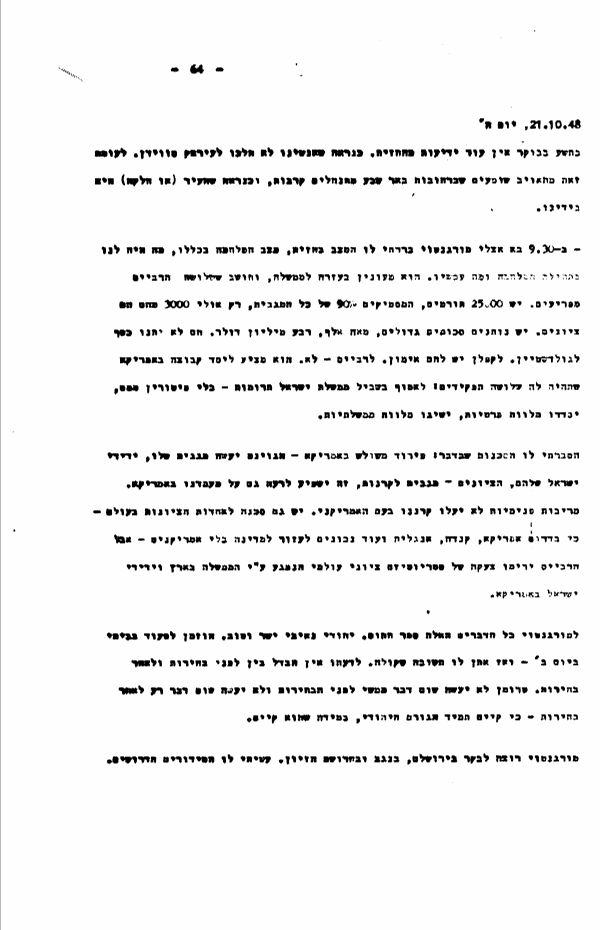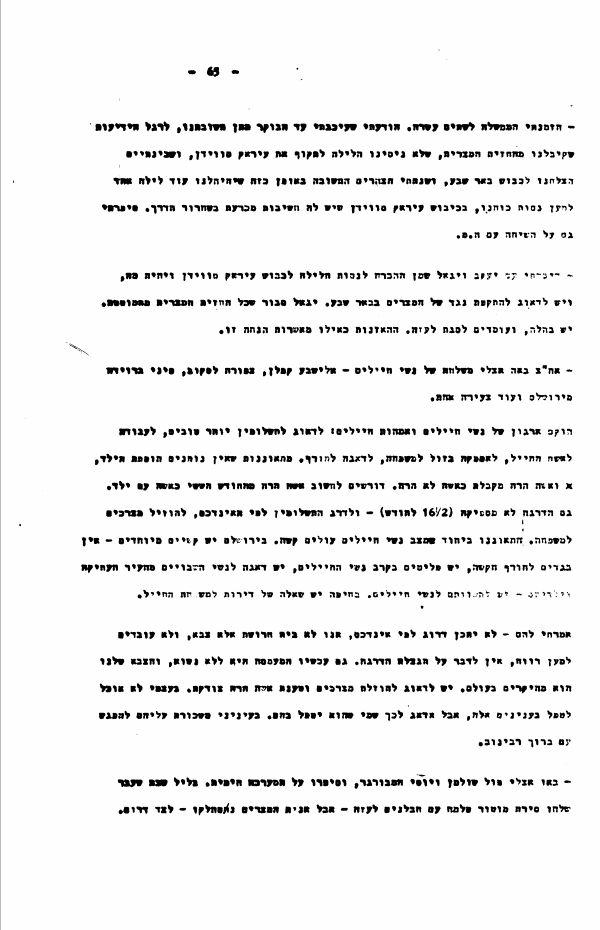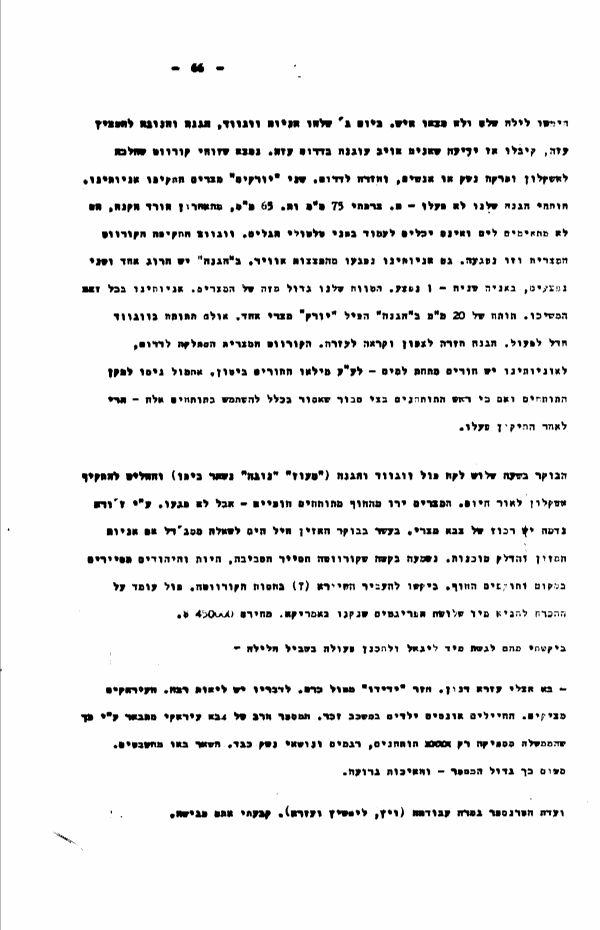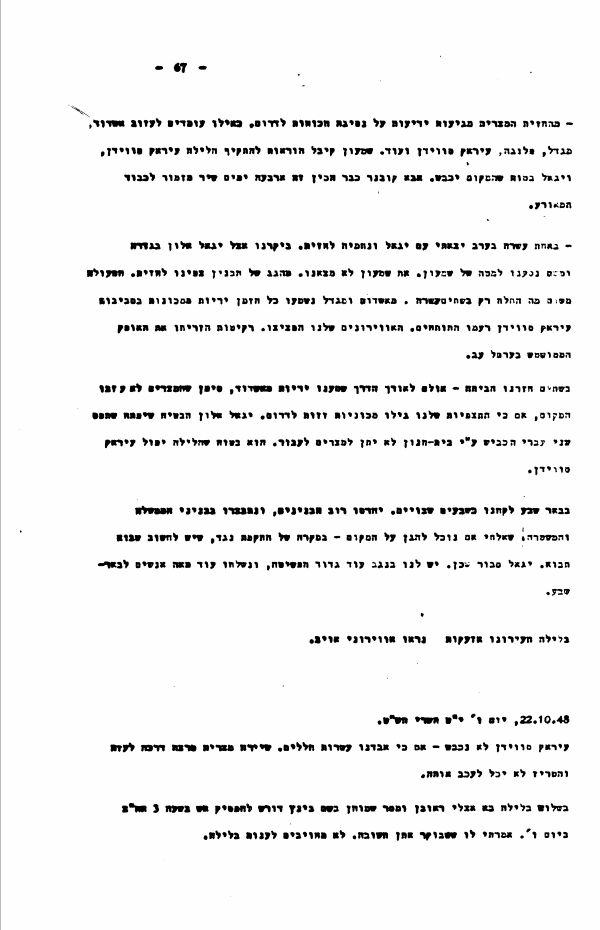1
of
Places:
England
United States
Be'er Sheva
Canada
Ashkelon
H̠erut
Qula
Haifa
Gaza
Jaffa
Egypt
Nogah
Ashdod
Gedera
Tulkarm
Migdal
Yiftah̠
Jerusalem
The use of the photograph is subject to the Copyright Law, 2007
20.10.1948
224891
Thursday, October 21, 1948 As of 9 a.m. still no news from the front. Apparently our men didn’t go to Iraq-Suweidan. In contrast, from enemy [reports] we hear that fighting is taking place on the streets of Beersheva, and apparently the city (or part of it) is in our hands. – At 9:30 [Henry] Morgenthau came to see me. I explained the situation at the front, the state of the war in general, what we had at the start of the war, and what [we have] now. He’s interested in helping the government, and thinks that the three rabbis [Stephen Wise, Hillel Silver and Israel Goldstein] are interfering. There are 25,000 donors, who provide 90% of all fundraising [by the UJA], only about 3,000 of them are Zionists. They donate large sums, 100,000, ¼ million. They won’t give money to [Israel] Goldstein. They have faith in [Eliezer] Kaplan. Not in the rabbis. He proposes founding a group in America that will have three functions: collecting donations for the government of Israel – without tax exemptions, arranging private loans, obtaining government loans. I explained the risks of this to him: a threefold split in America – the Joint [Distribution Committee] will pursue its own fundraising, Friends of Israel their own, the Zionists – fundraising for the funds [presumably entities such as the KKL (the Jewish National Fund) and Keren Hayesod]. This will also have a negative impact on our standing in America. Internal fights won’t enhance our prestige among the American people. It’s also a threat to Zionist unity around the world – because in South Africa, Canada, England, and elsewhere they’re willing to help the state without Americans – but the rabbis will raise a raucous about global Zionist patriotism being sabotaged by the government in the country and friends of [the state of] Israel in America. For Morgenthau all these things are a closed book [beyond his comprehension]. A good, honest, naïve Jew. He was invited to dine at my home on Monday – and then I’ll give him a measured answer. In his opinion there’s no difference between before the elections and after the elections [in the US]. Truman won’t do anything substantial before the elections and won’t do anything bad after the elections – because the Jewish factor, to the extent that it exists, is always there. Morgenthau wants to visit Jerusalem, the Negev, and the arms industry [Ta’as]. I made the necessary arrangements for him. – I summoned the government for 12 [to discuss the ceasefire]. I announced that I’ve postponed our answer until the morning, in light of news we’d received from the Egyptian front [primarily the commanders’ cable], that we didn’t try to attack Iraq-Suweidan during the night, and that in the meantime we’ve succeeded in conquering Beersheva, and that in the afternoon I provided an answer in a way that gives us one more night, in order for our forces to try to capture Iraq-Suweidan, which is of decisive importance in clearing the way. I also relayed the conversation with Henry Morgenthau. – I spoke with Ya’akov [Dori] and Yigael [Yadin] about it being imperative to try to capture Iraq-Suweidan tonight no matter what, and that it’s necessary to be ready for an Egyptian counter-attack in Beersheva. Yigael thinks that the entire Egyptian front is collapsing. There’s panic, and they’re going to withdraw to Gaza. The eavesdropping findings seem to confirm this assumption. – In the afternoon a delegation of soldiers’ wives came to see me – Elisheva Kaplan, Tzipora Laskov, Feigele Broida from Jerusalem and another young woman. An organization of soldiers’ wives and soldiers’ mothers has been formed: to pursue better payments, work for the soldier’s wife, cheap supplies for the family, addressing winter needs. They complained that there are no child benefits, and that a pregnant woman receives the same as a non-pregnant woman. They insist that a pregnant woman should be considered a woman with a child from the sixth month. Nor is the rank enough ([P£] 16½ per month) – and payouts should be ranked in accordance with the index, to reduce the cost of goods for the family. They complained in particular about the difficult situation of wives of immigrant soldiers. In Jerusalem there are special problems – there are no clothes for the harsh winter, there are refugees among the soldiers’ wives, there’s cause for concern about the wives of prisoners from the Old City and their children – they should be considered equivalent to wives of soldiers. In Haifa there’s the question of apartments for the soldier’s family. I told them – it’s not possible to rank according to the index; we’re not a factory but an army, and we don’t work for profit. There’s nothing to discuss in terms of increasing the rank. Even now the burden is unbearable, and our army is one of the most expensive in the world. The cost of goods should be reduced, and the complaint about a pregnant woman is justified. I can’t personally address these issues, but I’ll see to it that someone addresses them. Regarding salaries they need to meet with Baruch Rabinov. – Paul Shulman [Ben-Zvi] and Yossi Hamberger [Harel] came to see me, and told me about the naval operation. Last Saturday night they sent a Palmach motorboat with saboteurs to Gaza – but the Egyptian ships pulled out – southward. They searched the entire night and didn’t find anyone. On Tuesday they sent the ships Wedgewood, Haganah, and Noga to shell Gaza, [and] then they received a notice that an enemy ship was anchored in southern Gaza. It turned out that this was a corvette that had gone to Ashkelon and unloaded weapons or people, and returned to the south. Two Egyptian “Spits” [Spitfire planes] attacked our ships. Our Haganah cannons didn’t work – a 75 mm French C. and a 65 mm C. – the barrel was removed from the latter; they’re not suited to the sea and cannot take the rocking of the waves. The Wedgewood attacked the Egyptian corvette, inflicting damage. Our ships were also damaged by aerial bombings. The Haganah had one killed and two wounded, the other ship – 1 wounded. Our distance [from the port] is greater than that of the Egyptians. Our ships continued anyway. A 20 mm cannon on the Haganah brought down one Egyptian “Spit.” But the cannon on the Wedgewood stopped working. The Haganah returned north and called for help. The Egyptian corvette disappeared to the south; our ships have holes under the water – for now they filled the holes with concrete. Yesterday they tried to fix the cannons, and although the head of artillery in the navy believes these cannons shouldn’t be used at all – after the repair they worked. At 3 a.m. Paul took the Wedgewood and the Haganah (the Maoz and the Noga remained in Jaffa) and decided to attack Ashkelon by daylight. The Egyptians fired from the shore with coastal cannons – but didn’t hit. Near Jura [Majdal coastline, today Ashkelon] there seems to be a concentration of Egyptian forces. At 10 a.m. the navy eavesdropped on Majdal asking if the food and fuel ships are ready. A request was heard that a corvette patrol the area because the Jews are patrolling there and attacking the coast. They asked that the convoy (?) be transferred under the corvette’s protection. Paul is insisting that the three frigates bought in America should be brought over immediately; they cost $ 450,000. I asked them to approach Yigael [Yadin] immediately and plan an action for tonight. – Ezra Danin came to see me. His “friend” has returned from Tulkarm. According to him there’s a great deal of fatigue. The Iraqis are causing trouble. The soldiers are homosexually raping children. The large number of Iraqi soldiers is explained by the fact that the government provided only artillerymen, mortarmen, and heavy weapons bearers. The rest came from the tribes. This explains the large number – and the terrible quality. The Transfer Committee [for the Arab problem] finished its work (Weitz, Lifshitz [Zalman Leef], and Ezra [Danin]). I scheduled a meeting with them. – There’s news from the Egyptian front that the forces are retreating southward. It seems they’re about to leave Ashdod, Majdal, Faluja, Iraq-Suweidan, and elsewhere. Shimon [Avidan, Givati Brigade commander] received instructions to attack Iraq-Suweidan tonight, and Yigal [Allon?] is certain that the place will be captured. Four days ago Abba Kovner [brigade educational officer] already composed a song commemorating the event. At 11 p.m. I left for the front with Yigael [Yadin] and Nehemiah [Argov]. We visited Yigal Allon in Gedera and from there traveled to Shimon’s staff. We didn’t find Shimon. From the roof of the building we observed the front. For some reason the action only began at 12. [Heavy] machine [gun] fire sounded constantly from Ashdod and Majdal; the cannons roared around Iraq-Suweidan. Our airplanes bombarded. Rockets shone through the horizon blurred by a thick fog. At 2 we returned home – but the whole way we heard gunfire from Ashdod, indicating that the Egyptians weren’t leaving the place, although our lookouts saw vehicles moving southward. Yigal Allon promised that Yiftah, which captured both sides of the road near Beit Hanoun, won’t let the Egyptians pass. He’s certain that Iraq-Suweidan will fall tonight. In Beersheva we took about 70 POWs. [They’d] destroyed most of the buildings, and barricaded themselves in the government and police buildings. I asked whether we’ll be able to defend the place – in the event of a counter-attack, which we must assume will certainly come. Yigal [Allon?] thinks so. We have another raid battalion in the Negev, and we’ll send another 100 men to Beersheva. At night I was awakened by sirens; enemy airplanes were visible.












